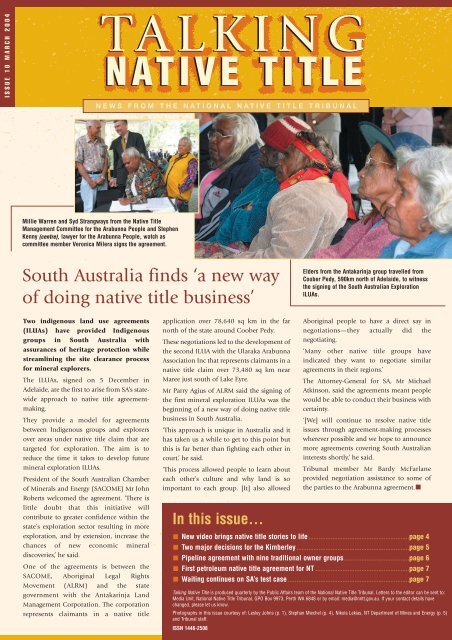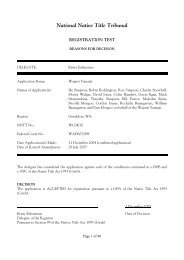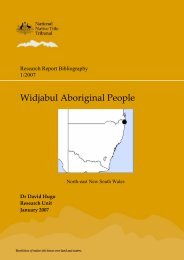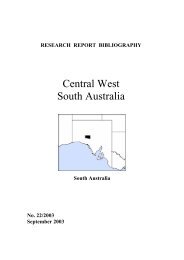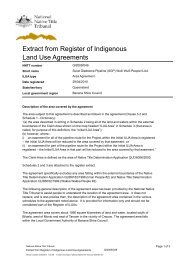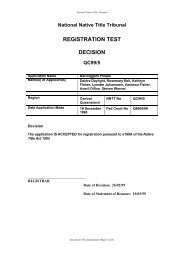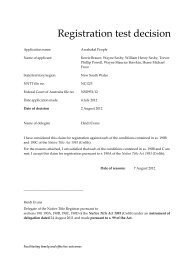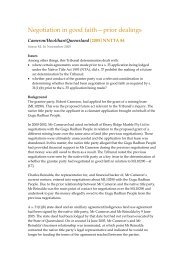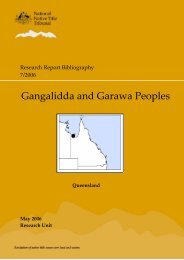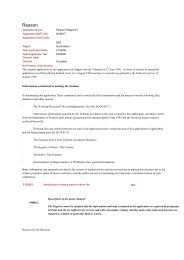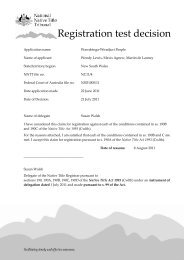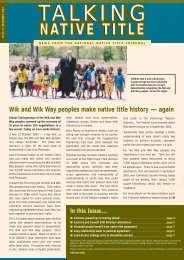Issue 10 - National Native Title Tribunal
Issue 10 - National Native Title Tribunal
Issue 10 - National Native Title Tribunal
- No tags were found...
You also want an ePaper? Increase the reach of your titles
YUMPU automatically turns print PDFs into web optimized ePapers that Google loves.
<strong>Tribunal</strong> President,Mr Graeme NeateQuiet anniversary of amomentous timeFrom the PresidentAt the height of the summer holiday season, the <strong>10</strong>th anniversary of the <strong>Native</strong> <strong>Title</strong> Actcoming into effect slipped by, virtually unheralded. The fact that the 1 January 2004anniversary attracted so little attention shows how much has changed in public attitudesabout native title in the past decade.It has been a fascinating andsometimes roller coaster-like<strong>10</strong> years. Not only have thecourts and parliaments beeninvolved in sorting outdetails of native title law andpractice, Australians have hadto come to terms with whatnative title means locally andnationally.Since 1994, we’ve hadlandmark (and sometimescontroversial) decisions fromthe High Court as well as asteady flow of judgmentsfrom the Federal Court.Names like Wik, Yorta Yortaand Miriuwung-Gajerrong arepart of the broader Australianlexicon as a result.Some people can remembervividly the debate over the1998 amendments to the Act.The significant changes that thoseamendments brought about are now part ofthe day-to-day business of native title.We are not likely to witness the same degreeof legislative and judicial activity in the nextfew years. Instead, people will explore andwork with the opportunities created in thefirst decade. People involved in native titlematters will opt to make agreements wherepossible rather than ask a court to sorteverything out for them.The foundations for agreement-making arein place, but making an agreement is not aformulaic exercise. We can build onexperience and learn from the others, but notwo sets of circumstances are the same.In some parts of Australia, groups ofAboriginal people will find it difficult if notimpossible to demonstrate the standard ofproof required to show that they have nativetitle.In other areas, where people havemaintained a strong traditional connectionto the land, their native title rights areunlikely to have survived the effect ofactivities like road and infrastructurebuilding or grants of titles to land. In otherwords, the law says that native title has beenextinguished even though, based on theirongoing connection, it would otherwisecontinue to exist.<strong>Native</strong> title applications can be settled invarious ways, including determinations ofnative title and indigenous land useagreements (ILUAs). The Act also states thatpeople involved in a native title applicationcan negotiate agreements that don’t involvenative title and they can ask the <strong>Tribunal</strong> tohelp them do this. The Federal Court can puta case on hold to allow time for thosenegotiations.More and more native title determinationsare accompanied by ILUAs and otheragreements that sort out the practical detailof recognising rights and interests. We arealso seeing non-native title agreements thatresult in some claimant applications beingwithdrawn.Every case is different and options that might bepart of agreements include:grants of title or other interests in landroles in managing what happens on land(e.g. national parks or other conservationreserves)symbolic recognition of traditional links toland (e.g. signs showing the name of thegroups whose traditional country it is)employment and other economicopportunitiesprovision of goods, services orinfrastructure to a groupfinancial assistance to a group (e.g. for theconstruction of a cultural centre or keepingplace).State and territory governments can play acritical role in exploring options for settlingnative title applications. The importantprinciple is that outcomes should be tailored tolocal circumstances and needs.As the <strong>Tribunal</strong> works in the field, we continueto see how the people most affected by nativetitle are finding ways to work together. Our newvideo <strong>Native</strong> title stories: Rights, recognition,relationships shows six vivid examples fromaround Australia of people finding commonground through native title (see page 4).The agreements that have been reached so farand the willingness of people to think creativelyabout practical results augur well for the future.Our continuing role is to work with people todevelop an understanding of native title and tohelp them reach native title agreements andother outcomes that work for them.page 2
Pastoral and indigenous partiesagree on access principlesLeft to right: PGApresident Barry Courtand GLSC chairman IanTucker at the signingceremony.Left to right: Goldfields Land and Sea Council chairman Ian Tucker,WA Deputy Premier Eric Ripper and PGA president Barry Court sign theprinciples document as <strong>Tribunal</strong> member Bardy McFarlane looks on.A more positive relationship betweenpastoralists and Indigenous people inWestern Australia’s Goldfields region isthe expected benefit of a landmarkagreement reached last month.At a ceremony in Perth in early February,representatives from the Pastoralists andGraziers’ Association of Western Australia(PGA) and the Goldfields Land and SeaCouncil (GLSC) came together to sign theGoldfields Pastoral Access Principles. WADeputy Premier Mr Eric Ripper witnessedthe signing on behalf of the stategovernment.Designed to facilitate agreement-makingbetween pastoralists and Indigenous peoplein the area, the 14 principles address thingslike the rights of pastoralists to grazelivestock, the responsibilities of Aboriginalpeople to care for country and pass oncultural knowledge, the need to protect sitesof significance and how to resolve disputes.<strong>Tribunal</strong> member Mr Bardy McFarlane, whohelped negotiate the agreement, said theprinciples recognised the rights and interestsof all parties in a fair and unbiased way.‘These principles are a major step forward inthe Goldfields and they provide a model toIndigenous people and pastoralists aroundAustralia,’ he said.The regional agreement, which arose at thesuggestion of the Goldfields <strong>Native</strong> <strong>Title</strong>Liaison Council, is only one of four enteredinto between pastoralists and native titleclaimants in Australia. It is the first to coveran area as large as the Goldfields, whichstretches from Esperance in the south toLaverton in the north and, at three times thesize of Victoria, is WA’s largest region.Potentially, more than 140 pastoralists in thearea can use the principles in furthernegotiations with Indigenous people. PGApresident Mr Barry Court said the principlesreflected a cooperative relationship thatexisted already.‘These access principles give pastoralists theability to formalise the goodwill that hascontinued to exist between station ownersand their Aboriginal friends,’ he said.GLSC executive director Mr Brian Wyatt saidlong-term relationships between the groupswould now be strengthened.‘Pastoral lease areas and our traditionallands are one and the same,’ he said. ‘Wecongratulate the PGA for its common senseapproach to the burning and enduring needfor Indigenous people to stay close to theircountry.’ATSIC south-east zone commissioner MrDarren Farmer welcomed the landmarkagreement, describing it as a benchmark fornegotiations between Indigenous groupsand industry.‘Agreement on the access principles has beenreached in a spirit of goodwill andcooperation that should serve as a model forresolving conflicts in other areas,’ he said.page 3
Mervyn Mulardy Jnr of the Karajarri Peoplebeing interviewed on a beach nearBidyadanga, south of Broome, during the<strong>Native</strong> <strong>Title</strong> Stories video shoot in April 2003.New video brings nativetitle stories to lifeWith camera whirring and the sound manslowly sinking into knee-deep water,Mervyn Mulardy Jnr relates the story ofhis Kimberley community’s long strugglefor native title recognition. Prompted onceor twice by the interviewer, Mervyn talksabout the visit in 2000 to Karajarri countryby a Federal Court judge and how the elderstook him to the desert to tell the judge ‘everylittle thing about Karajarri life’. Then he talksabout the court hearings in Perth in whichthe elders had their evidence challenged bybarristers and the meetings that eventuallyled to a determination of native title early in2002.As the story unfolds the noon day sun beatsdown on the crew until eventually the soundman calls for a break so he can extracthimself from the sticky Kimberley mud.Being behind the scenes of <strong>Native</strong> <strong>Title</strong> Stories:Rights, recognition, relationships —a new videodocumentary produced by and for the<strong>Tribunal</strong> — was at times sweaty and at othertimes exhausting, but at all times fascinating.Shot in separate sessions in April and June lastyear, the 37-minute program travels fromSaibai Island in the Torres Strait, to theKimberley and the Burrup Peninsula in WA,Mt Isa and Camooweal in north-westQueensland and Byron Bay on the NSW northcoast.Launched in Sydney last month in thecompany of former High Court judge MsMary Gaudron QC, the video is available forfree to anyone wanting to know what toexpect from native title.VHS or DVD copies can be ordered from the<strong>Tribunal</strong>’s web site www.nntt.gov.au under‘Information and Publications’, or byphoning freecall 1800 640 501.Forum sets newdirection for nativetitle in QueenslandA collaborative approach to native titleemerged as the best path forward at aforum hosted by the <strong>Tribunal</strong>’sQueensland registry from 16 to 17December.The Queensland <strong>Native</strong> <strong>Title</strong> Forum 2003was an opportunity to discuss ways to makethe process work more effectively foreveryone involved.Representatives from state andCommonwealth governments, native titlerepresentative bodies, QueenslandIndigenous Working Group, QueenslandResources Council, Agforce, QueenslandSeafood Industry Council, Indigenous LandCorporation and the Federal Courtattended.They agreed that the forum was an excellentopportunity to exchange information anddiscuss state-wide issues. The discussion willcontinue through a representative groupthat will meet three times a year.page 4Left to right: James Sunter, Departmentof Natural Resources, Mines and Energy,Marita Stinton, Cape York Land Counciland <strong>Tribunal</strong> member DouglasWilliamson at the forum.The <strong>Tribunal</strong>’s Queensland state manager MrKevin Smith said the group’s commitment towork together more closely meant a freshstart for 2004.‘From here on, native title stakeholdergroups will be able to plan ahead moreeffectively, move in the same direction andcoordinate with the Federal Court,’ he said.‘This will enable the groups to maximisetheir resources, explore agreement-makingoptions and strengthen their existingrelationships.’The Hon. Justice Dowsett of the FederalCourt spoke on the native title practice of thecourt in Queensland and outlined itsproposal to schedule trials for Queenslandclaims at the rate of one trial per region peryear.Participants were also informed of the stategovernment’s new connection guidelinesand the new approach to cultural heritageprotection.Two major nativeIn the space of 24 hours in earlyDecember, the Federal Court handeddown two decisions recognising nativetitle over two separate areas of WesternAustralia’s Kimberley region.In the Wanjina/Wungurr-Willinggin andNgarinyin peoples’ case, the claimant groupwas found, in a draft determination, to holdnon-exclusive native title rights and interestsover much of the area covered by theirapplication.Over some areas it was found that they heldexclusive native title, mostly over leases orreserves held by or for the benefit ofAboriginal people and some unallocatedCrown land. Over other areas native title wasfound to be completely extinguished.The claimants had sought native titlerecognition over two adjoining areas, covering59,903 sq km and 7,229 sq km of theKimberley respectively. The determination isexpected to be finalised soon.Justice Sundberg found that the claimants hadvery strong traditional connection to theircountry, despite the fact that their laws andcustoms had been modified and ‘to someextent diluted by the changed circumstancesof the older applicants and their forebears’.Despite the effects of European settlement,the judge said connection could bemaintained by continued acknowledgment oftraditional laws and continued observance of
Traditional ownersto access pastoralland in Cape YorkA representative from eachfamily group of theInkerman traditionalowners' clan group signedthe agreement.Evan Ryan of Inkerman Station directedmany of his comments to Inkermanelder Kenny Jimmy. Young Kowanyamapeople performed traditional dancesbefore the speeches.title decisions for the Kimberleytraditional customs. This was shown in thefact that traditional practices and ceremonieswere being maintained and the ritualknowledge underlying traditional law andcustom continued to be passed down fromgeneration to generation.One day later and after almost <strong>10</strong> years ofcourt cases and negotiation, the Full FederalCourt ratified two consent determinationsthat will finally settle the Miriuwung andGajerrong people’s native title claim.This case, which became known as Ward afterits lead claimant Mr Ben Ward, raisednumerous legal questions that were answeredby the High Court in 2002. But even then,aspects of the case were referred back to theFederal Court for further hearing anddetermination.The parties, including the WA and NTgovernments and claimant groups, ended upcoming to an agreement about theseoutstanding aspects late last year enabling theconsent determinations to be made on 9December.<strong>Native</strong> title rights and interests on the NT sidewere determined to be held over three estateareas by the members of each estate group andcertain other Aboriginal people with rights inthe estate area under traditional law andcustom. Over those parts of the determinationarea that are Aboriginal freehold, exclusivenative title rights were recognised.Over the remainder, the non-exclusivenative title rights recognised included rightsto hunt, gather and use the naturalresources of the area; to access and usenatural water on the land; to live, camp anderect shelters on the land and to moveabout the land; and to conduct ceremonies,hold meetings and participate in culturalpractices relating to birth and death.In the WA determination area, native titlewas determined to be held by theMiriuwung and Gajerrong people,including people who identify asMandangala Miriuwung, Doolboong orWardenybeng.The native title determination will not takeeffect until a prescribed body corporate forthe native title holders is determined by theFederal Court. When it does, exclusivenative title will be recognised over apastoral lease held by the claimants, somereserves for the use and benefit ofAboriginal people and some areas ofunallocated Crown land.Certain non-exclusive rights were alsorecognised.<strong>Tribunal</strong> President Graeme Neatewelcomed the concluding chapter of theMiriuwung Gajerrong people’s strugglesaying it further highlighted the enormouscosts—human and financial—oflitigation.For the first time in around 60 years,traditional owners from an area of CapeYork covered by one of Queensland’slargest pastoral stations will be able togo on to the property and use parts ofit for traditional purposes.This follows the signing on 23 February of amemorandum of understanding betweenMr Evan Ryan, leaseholder of InkermanStation—a 135,000-hectare cattle propertyon the Gulf of Carpentaria north-west ofNormanton—and Inkerman traditionalowners. At a ceremony to mark the signingat Kowanyama community, Mr Ryan saidhe hoped station management andtraditional owners could learn from eachother about preserving country andmanaging the land. Inkerman elder MrKenny Jimmy said he was looking forwardto going back to visit the land where he wasborn.A permanent camping structure will bebuilt within an 800-hectare area betweentwo rivers on the property—this area hasbeen set aside for the use of theKowanyama People. The agreement hasalso led to a proposal for eight traditionalowners to be employed as guides for thetourism division of Inkerman Station. Theywill be trained on site through a stategovernment-funded training program.The Inkerman MoU, which has taken a yearto negotiate, is the first stage in thedevelopment of an indigenous land useagreement.page 5
Pipeline accord brings ninetraditional owner groupstogetherThe construction of a 390-kilometre gaspipeline between Moranbah in centralQueensland and Townsville will getunder way this month following thefinalisation late last year of threeindigenous land use agreements (ILUAs).The ILUAs—agreed between nine traditionalowner groups along the path of the pipelinearound the Bowen Basin and the NorthQueensland Gas Pipeline Project—wereregistered with the <strong>Tribunal</strong> in Decemberafter 14 months of negotiations.The nine groups include the Barada BarnaKabalbara and Yetimarla, Wiri, the InlandNebo Group, Jangga, Birri, Kudjala, Juru,Bindal, and Wulgurukaba peoples.At a celebration event in Townsville on 21January, pipeline project representative MrPaul Maloney thanked the traditional ownergroups for their ‘constant commitment tothe negotiations’.‘The project ispleased withthe positiveoutcome for allparticipants,’ hesaid.Traditional owner negotiators said theagreements showed ‘what Aboriginal peopleand developers can do when they sit downtogether and negotiate directly with eachother’.One of the outcomes of the negotiation wasa separate cultural heritage managementplan that requires all workers on the projectto undertake induction training about thenine traditional owner groups. Allconstruction workers will view a video inwhich elders explain the need for respect fortraditional land and country.<strong>Tribunal</strong> member Mr Graham Fletcher, whoassisted the groups with the ILUA processThe traditional owners’ combined negotiatingteam, Enertrade joint venture team and <strong>Tribunal</strong>representatives meet in Townsville to formalisethe three indigenous land use agreements.and development of the plan, said theagreements provided social and economicbenefits for the traditional owners andassurances that cultural heritage would notbe adversely affected by the pipeline’sconstruction.‘By working together cooperatively thegroups have developed relationships thatcan be built upon in the future,’ he said.Regional heritage agreementsto help reduce WA backlogAboriginal, mining and governmentrepresentatives in Western Australiahave reached regional agreements tohelp to reduce the backlog of miningtenement applications in the state whileensuring respect and protection forAboriginal heritage.The agreements are the result of thecollaborative approach of the HeritageProtection Working Group (HPWG) whichwas set up by the WA Government in July2002 in response to recommendations ofthe government’s Technical Taskforce onMineral Tenements and Land <strong>Title</strong>Applications.The taskforce released a report in November2001 identifying how the backlog ofmineral tenements and land titleapplications could be dealt with moreefficiently while protecting Indigenouspeople’s native title rights.<strong>Tribunal</strong> member Mr Bardy McFarlanefacilitated the Heritage Protection WorkingGroup which comprised representatives ofthe mining industry, native titlerepresentative bodies and stategovernment agencies.The <strong>Tribunal</strong> convened more than <strong>10</strong>0negotiation meetings, and agreements arenow in place in the Goldfields and SouthWest regions. An agreement has also beenreached in the Yamatji and Pilbara regions,with individual native title claimantgroups to be consulted before it isfinalised.Mr McFarlane said an agreement was closeto finalisation in the Ngaanyatjarra regionand discussions were still ongoing in theKimberley region.‘I acknowledge and congratulate the nativetitle representative bodies, miningindustry and the state government for theirperseverance in working together to tacklethese complex issues and producingworkable solutions,’ Mr McFarlane said.Buildingrespectfor culturalheritageMs Christine George, a Wulgurukaba womanfrom Magnetic Island off Townsville in northQueensland, has been appointed culturalheritage induction trainer for the NorthQueensland Gas Project. This meanstraining every worker on the project aboutthe importance of respecting the traditionalcountry of the nine Indigenous groups alongthe pipeline.‘The information (being presented) has to bethe correct information about artefacts andsignificant sites and the cultural landscape,’she said. ‘I’m confident that people willrespect the information they receive.‘It’s the law now and the cultural heritagemanagement plan outlines what willhappen to staff who disregard it. (Workers)have to develop that respect for all thecultural heritage issues.’As part of the agreed cultural heritage plan,Aboriginal monitors will be working alongthe pipeline to ensure sites are respected andprotected.page 6
Left to right: NT Minister for Mines and EnergyKon Vatskalis, Northern Land Council CEO NormanFry, president of Sweetpea Corporation Thomas ADugan and petroleum consultant (KEXCO) BillKahla at Parliament House in Darwin.NT’s first petroleum nativetitle agreement signedIt took almost three years ofnegotiations but traditional owners andinternational petroleum explorerSweetpea Corporation have hailed as asuccess their agreement that enablesSweetpea to explore 14,000 squarekilometres of land in the NewcastleWaters region of the Northern Territory.It is the first petroleum native title agreementto be mediated in the Northern Territory andaccording to the Northern Land Council(NLC) which negotiated on behalf of 13groups of traditional owners, it sets outparameters for exploration and production,including safeguards for the environmentand sacred sites.The 13 groups of traditional owners are fromlanguage groups including Mudburra,Jingili, Wampaya, Gurdanji, Mangarrayi andYangman people. On their behalf, the NLCalso reached an agreement with explorationcompany Pardi Pty Ltd over land adjacent toSweetpea Corporation’s site.The <strong>Tribunal</strong> convened a series of meetingsto facilitate negotiations between parties tothe Sweetpea agreement between October2002 and April 2003 following a requestfrom the company for mediation assistance.<strong>Tribunal</strong> Deputy President Mr ChristopherSumner, who facilitated mediation, said theagreement demonstrated what resourcecompanies and Indigenous groups couldachieve under the <strong>Native</strong> <strong>Title</strong> Act if theytalked through issues with the aim ofreaching an agreement.‘Resource industries and native title claimantgroups are becoming increasingly aware thatagreement-making and relationshipbuilding [are] the best way forward,’ he said.‘Parties to the Sweetpea agreement carriedout substantive negotiations themselves andthe <strong>Tribunal</strong> encourages other groups to takea similar approach.’NLC chief executive Mr Norman Fry said theagreements would act as templates for otherpetroleum explorers interested in the searchfor hydrocarbons in the Northern Territory’ssedimentary basins.‘The native title petroleum agreements arethe first ever signed in the NLC’s area and itis to both companies’ credit that they wantednative title issues solved ahead ofexploration,’ he said.Vice president of Sweetpea Corporation MrMalcolm Gerrard said negotiation was theonly path to take. ‘We’ve achieved our goaland achieved the granting of permits and ifother operators want to investigate areas inthe NT they should take this path.’Mr Gerrard said the lengthiness of theprocess had been a concern as they hadapplied for exploration permits inNovember 2000 and had expected the grantswithin three to six months but ‘native titlehad intervened’.However he said during the three years ofnegotiations the company had developed agood working relationship with the partiesthat would assist with their futurediscussions with the Aboriginal groups.‘As part of the outcome of getting anagreement, our camaraderie with the NLChas been strengthened. With ourcamaraderie there’ll be a betterunderstanding of our goals and of those ofthe NLC and the claimants.’NT Minister for Mines and Energy Mr KonVatskalis said: ‘Sweetpea has clearly shownnegotiation with traditional land owners isthe way forward for the petroleum industry,and in securing this agreement, has pavedthe way for future deals through the right tonegotiate process.’Waiting continues on SA’s test caseSouth Australian pastoralists and nativetitle claimants are yet to learn whetherimprovements to pastoral leasesextinguish native title.On 16 December the Full Federal Courtdeferred its decision on whether a native titleclaimant group from the YankunytjatjaraPeople in South Australia had native titlerights and interests over De Rose Hill station(see story in Talking <strong>Native</strong> <strong>Title</strong>, June 2003).The Full Court was ruling on an appealbrought by the Aboriginal Legal RightsMovement (ALRM) on behalf of the nativetitle applicants against Justice O’Loughlin’searlier decision on 1 November 2002. In thatdecision, the claimant group was found tohave lost connection to the claimed area andtherefore native title was not recognised.The Full Court found that Justice O’Loughlinhad not applied the correct legal test whenhe decided the case.The court also said it needed furthersubmissions from the parties before it coulddecide whether the claimants had lost theirconnection to the area through ceasing topractise their traditional laws and customson the lands.A decision on whether improvements toSouth Australian pastoral leases extinguishednative title was not made as the court believedthat the connection issue should be addressedfirst.The Yankunytjatjara People’s claim is viewedas a test case in South Australia as it isexpected to clarify questions about traditionalconnection and the survival of native title onpastoral leases in the state.The Full Federal Court is to receive furthersubmissions from the parties before it handsdown its decision.page 7
INSIDE INFORMATION<strong>Tribunal</strong> shares geospatialknowledge across bordersRepresentatives from the <strong>Tribunal</strong>’s Geospatial Analysis andMapping unit attended the ‘Understanding <strong>Native</strong> <strong>Title</strong> from aGeospatial Perspective’ workshop in Canberra in September.The workshop, sponsored by the <strong>Tribunal</strong>, aimed to provide abroader understanding of the geospatial characteristics ofnative title.Representatives from industry groups, government departments andnative title representative bodies attended the workshop.Delegates from New Zealand’s Waitangi <strong>Tribunal</strong>, Land InformationNew Zealand and the Fiji Land Information Centre allowed forinformation sharing at an international level.The 50 participants reached consensus on ways to streamlinemapping and spatial data associated with native title.<strong>Tribunal</strong> director of service delivery, Mr Hugh Chevis, said theworkshop illustrated the <strong>Tribunal</strong>’s ability to facilitate access toinformation and the development of skills needed to understandnative title and its issues better.Workshop presentations can be viewed at the <strong>Tribunal</strong>’s web site atwww.nntt.gov.au/procedures/files/Geospatial_workshop/index.htmlCall for volunteers to review<strong>Tribunal</strong> web siteThe <strong>Tribunal</strong> is about to start a review of its web site following arevamp in October 2002. ‘It has been nearly 18 months since the newsite was launched and now it’s time to find out if people are satisfiedwith it and look at ways we might be able to improve it,’ <strong>Tribunal</strong>public affairs manager Mr Tim Evans said. ‘The <strong>Tribunal</strong> is looking forvolunteers to take part in the review—it doesn’t matter if someone isa regular or occasional user, we need to get as much feedback aspossible to make it successful.’People can participate in either an online survey or telephoneinterview. If you would like to volunteer, please contact TinaO’Connor on 1800 640 501 (freecall) or (08) 9268 7238 (direct) oremail tinao@nntt.gov.au .www.nntt.gov.auNew managerfor the NTMr Tony Shelley is the newmanager of the <strong>Tribunal</strong>’sNorthern Territory office.Originally from north-easternVictoria, Tony worked as a solicitorin general practice and at theVictorian bar before moving toPerth where he worked for the Aboriginal Legal Service of WesternAustralia for five years. In 1998 he started work with the <strong>Tribunal</strong>as a senior case manager in NSW. After periods acting as managerfor the NT and Queensland registries of the <strong>Tribunal</strong> he becamethe state manager for Victoria and Tasmania in 2001. Now back inthe Territory he says he is looking forward to creating innovativeways for the <strong>Tribunal</strong> to add value to the agreement-makingenvironment.Member appointment andreappointmentsProfessor Lawrence Boulle has been appointed as a part-timemember of the <strong>National</strong> <strong>Native</strong> <strong>Title</strong> <strong>Tribunal</strong>, starting his threeyearterm this month. A lecturer in the school of law atQueensland’s Bond University, Professor Boulle teachesalternative dispute resolution and is also chair of the <strong>National</strong>Alternative Dispute Resolution Advisory Council. Dr GayeSculthorpe, who has been a part-time member of the <strong>Tribunal</strong>since February 2000, was made a full-time member in theGovernor General’s December announcement while Mr GraemeNeate was reappointed as President of the <strong>Tribunal</strong> for anotherthree years.Opposing the registration of anILUA—facts you should knowIf you are involved in negotiations of an indigenous land useagreement (ILUA), you might be interested in the latest fact sheetfrom the <strong>Tribunal</strong>—Opposing registration of an area agreement. Inplain English, the fact sheet explains who is able to oppose orobject to the application to register an area ILUA and theconditions under which an objection can be made. The provisionsin the <strong>Native</strong> <strong>Title</strong> Act for opposing the registration of anagreement are an important fail-safe in the ILUA registrationprocess, which is managed by the <strong>Tribunal</strong>.This fact sheet is available free of charge from all registries of the<strong>Tribunal</strong> and from the web site at www.nntt.gov.au underInformation and Publications, Fact sheets.NATIONAL NATIVE TITLE TRIBUNALLevel 4 GPO Box 9973 Perth WA 6848Commonwealth Law Courts Tel: (08) 9268 72721 Victoria Avenue Fax: (08) 9268 7299Perth WA 6000 Freecall (State Registries): 1800 640 501www.nntt.gov.au


